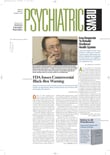For patients with social anxiety disorder, there appears to be no added benefit to combining two widely used treatments, new research shows. Unlike major depression, where combining cognitive-behavioral therapy (CBT) and pharmacotherapy has been shown to produce a synergistic boosting of patients' outcomes, patients with social anxiety disorder do just as well whether they receive an SSRI, a comprehensive form of CBT, or both.
Jonathon R.T. Davidson, M.D., an associate professor of psychiatry at Duke University Medical Center in Durham, N.C., along with colleagues at the University of Pennsylvania compared the efficacy of the SSRI fluoxetine alone, comprehensive CBT (CCBT) alone, placebo pill alone, the combination of CCBT plus fluoxetine, and CCBT plus placebo in 295 patients. The research, funded by a grant from the National Institute of Mental Health, was published in the October Archives of General Psychiatry.
Generalized social anxiety disorder, which the researchers referred to as generalized social phobia (GSP), has been estimated to affect as much as 14 percent of adults in the United States and begins early in life. It is often persistent and rarely remits.
Five Treatment Groups Studied
Patients were randomly assigned to one of the five treatment groups in the study, and independent raters were used who were blind to treatment assignment. Fluoxetine was started at 10 mg a day and increased to 40 mg a day by day 30 of the 14-week study. If subjects taking fluoxetine were not significantly improved on 40 mg a day and were tolerating the medication satisfactorily, the dose could be increased to a maximum of 60 mg a day. Compliance with fluoxetine/placebo was monitored through pill counts and medication logs.
The comprehensive form of CBT was a 14-week group treatment that combined“ in vivo exposure” involving role playing, cognitive restructuring, and social-skills training. Skills training included how to begin a conversation with a stranger and how to improve certain social interactive skills, like maintaining eye contact. Sessions were held once a week and included both men and women therapists. The first two sessions were educational in nature, with later sessions advancing in difficulty with increased interaction between patients and therapists and between patients themselves.
All patients were independently rated at four, eight, and 14 weeks using the Clinical Global Impression–Improvement scale (CGI-I), the Clinical Global Impression–Severity scale (CGI-S), and the Brief Social Phobia Scale (BSPS) as the primary outcomes for the study. In addition, the Social Phobia and Anxiety Inventory was used as a secondary measure.
By week 14, 54.2 percent of those receiving both fluoxetine and CCBT reported “very much improvement” (CGI-I score of 1) or “much improvement” (CGI-I score of 2) in their social phobia. In the group taking only fluoxetine, 50.9 percent reported a CGI-I of 1 or 2. Of those patients assigned to receive only CCBT, 51.7 percent achieved a CGI-I of 1 or 2. Of those receiving the CCBT/placebo combination, 50.8 percent achieved a CGI-I of 1 or 2. Lastly, of those assigned to receive only placebo, 31.7 percent achieved a CGI-I of 1 or 2.
Faster Response Seen With Fluoxetine
“All active treatments were superior to placebo on primary outcomes,” Davidson and his coauthors wrote. “Combined treatment did not yield further advantage. Notwithstanding the benefits of treatment, many patients remained symptomatic after 14 weeks.”
However, fluoxetine was found to generate a faster response than the comparison treatments. By week 4, fluoxetine showed superiority to CCBT/fluoxetine together, CCBT/placebo together, and placebo alone. By week 14 the degree of improvement did not significantly differ between CCBT and fluoxetine.
“Such a finding suggests that greater advantage would accrue from a strategy of initial treatment with an SSRI, followed by augmentation with psychosocial treatment after four to eight weeks,” the authors observed, noting they are planning to study such a treatment scheme for GSP.
Significantly higher rates of specific treatment-emergent events were noted on a few symptoms. Both insomnia and headache were more common in the placebo and CCBT/placebo groups compared with the CCBT group and in the CCBT/fluoxetine and fluoxetine groups compared with CCBT alone. This“ indicates that pill taking itself (whether drug or placebo) is associated with a high rate of headaches and insomnia,” the authors noted.
Similarly, nausea occurred more often in the placebo and CCBT/placebo groups relative to the CCBT alone group, and in the fluoxetine group, relative to the CCBT group.
Davidson and his coauthors wondered “whether longer-term pharmacologic treatment is necessary and if changes in the delivery of CCBT would improve results.”
Arch Gen Psychiatry 2004 61 1005
